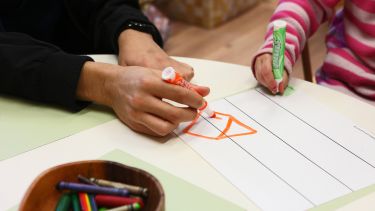Key themes
In each of these themes, our research creates pathways for impact and engagement, where we work with many different groups, communities and organisations.

Learning, pedagogy, curriculum, assessment
Our disciplinary focused research includes literacy - earning, pedagogy, curriculum and home-practices - multi-literacies and multimodality.
We critically engage with socio-political contexts in which early childhood education is defined and organised nationally and internationally.
We engage in contemporary debates around children’s learning, multi-theoretical perspectives and critical perspectives on pedagogy.
Our work enables us to inform policy-making and to adopt critical perspective son pedagogy, curriculum and assessment in theory and practice.
Play
We take a critical approach to researching play and play worlds including traditional and digital, and blending on and offline play.
We are interested in new play communities, children’s play lore and cultures and critical engagement with play in relation to policy outcomes on health, well-being, education.
Our play research concerns debates about play in relation to pedagogy, curriculum and assessment, cultural understandings of play, and play identities.
We led the first Massive Open Online Course (MOOC) on ‘Exploring Play’ which includes interdisciplinary play research.
Children’s lives, perspectives and experiences
Our theoretical, methodological and ethical concerns with understanding children and childhoods involve the development of respectful and ethical ways of engaging with children in research and practice.
Issues of ‘voice’ and ‘voices’ is a long-established concern, including children’s engagement with issues that matter to them wherever they are in the world.
Professionalism and professional knowledge
Our research critically interrogates the intersections between professional qualifications and the quality of provision in the context of local, national and global policy discourses. We understand conceptions of education, care and love as central to contemporary debates about how professional knowledge is constructed and enacted in practice.
Superdiversity
Our research focuses on children, families and practitioners in superdiverse contexts, to reflect community languages, histories and cultural practices. In addition to a global perspective, we promote the importance of local values, beliefs and customs in supporting young children’s education and well-being.
